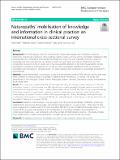Files in this item
Naturopaths’ mobilisation of knowledge and information in clinical practice : an international cross-sectional survey
Item metadata
| dc.contributor.author | Steel, Amie | |
| dc.contributor.author | Leach, Matthew | |
| dc.contributor.author | Brosnan, Caragh | |
| dc.contributor.author | Ward, Vicky | |
| dc.contributor.author | Lloyd, Iva | |
| dc.date.accessioned | 2021-08-10T14:30:10Z | |
| dc.date.available | 2021-08-10T14:30:10Z | |
| dc.date.issued | 2021-08-06 | |
| dc.identifier | 275346901 | |
| dc.identifier | c19bd060-8c67-4b24-bd59-74e3e695b7d9 | |
| dc.identifier | 85112132375 | |
| dc.identifier | 000682480600001 | |
| dc.identifier.citation | Steel , A , Leach , M , Brosnan , C , Ward , V & Lloyd , I 2021 , ' Naturopaths’ mobilisation of knowledge and information in clinical practice : an international cross-sectional survey ' , BMC Complementary Medicine and Therapies , vol. 21 , 205 . https://doi.org/10.1186/s12906-021-03383-2 | en |
| dc.identifier.issn | 2662-7671 | |
| dc.identifier.other | RIS: urn:7A37FFC4DA10AA20A2A1D2FA736A121C | |
| dc.identifier.other | RIS: Steel2021 | |
| dc.identifier.other | ORCID: /0000-0001-8684-0403/work/98197282 | |
| dc.identifier.uri | https://hdl.handle.net/10023/23751 | |
| dc.description.abstract | Background The contemporary evidence-based practice model acknowledges the importance of patient preferences and clinician experience when applying evidence within a clinical setting. Knowledge mobilisation (KM) acknowledges the complexities of knowledge translation by recognising and respecting diversity in types of knowledge and how such diversity can influence health care and health care choices. While there has been considerable discussion on KM in health care, it has received little attention in the field of naturopathy. Despite naturopathy’s widespread international use, it is unclear how naturopathic practitioners (NPs) use and share knowledge and information in clinical practice. This study examines the mobilisation of knowledge amongst NPs internationally. Methods Online, international, cross-sectional survey of a self-selected sample of NPs from any country, that were either currently in clinical practice or had been in practice within the previous 12 months. The survey was administered in five languages (English, French, Portuguese, Spanish, German). Descriptive statistics were prepared for all survey items. Results The survey was completed by 478 NPs who reported using an average of seven (median = 7, SD = 2.6) information sources to inform patient care. NPs also drew on knowledge gained through patients sharing their perspectives of living with their health condition (Always/Most of the time: 89.3%). They mostly sought knowledge about how a treatment might benefit a patient, as well as knowledge about treatment safety and a better understanding of a patient’s health condition. NPs frequently reported sharing knowledge developed through consideration of the patient’s unique needs (83.3%), and primarily shared knowledge by producing information for the public (72.6%) and for patients (72.2%). Conclusions Based on these findings, it may be argued that NPs practice knowledge mobilisation; employing multiple forms and sources of knowledge, and mobilising knowledge to - as well as from - others. Due to their active engagement in patient and community education, NPs also may be considered knowledge brokers. In the context of the growing understanding of the complexities of knowledge translation and mobilisation in contemporary health care – and particularly within the context of implementation science – this study provides novel insights into an under-researched element of health services accessed by the community. | |
| dc.format.extent | 12 | |
| dc.format.extent | 1098482 | |
| dc.language.iso | eng | |
| dc.relation.ispartof | BMC Complementary Medicine and Therapies | en |
| dc.subject | Evidence-based practice | en |
| dc.subject | Knowledge mobilisation | en |
| dc.subject | Knowledge translation | en |
| dc.subject | Naturopathy | en |
| dc.subject | RZ Other systems of medicine | en |
| dc.subject | HD28 Management. Industrial Management | en |
| dc.subject | Complementary and alternative medicine | en |
| dc.subject | NDAS | en |
| dc.subject.lcc | RZ | en |
| dc.subject.lcc | HD28 | en |
| dc.title | Naturopaths’ mobilisation of knowledge and information in clinical practice : an international cross-sectional survey | en |
| dc.type | Journal article | en |
| dc.contributor.institution | University of St Andrews. School of Management | en |
| dc.identifier.doi | 10.1186/s12906-021-03383-2 | |
| dc.description.status | Peer reviewed | en |
This item appears in the following Collection(s)
Items in the St Andrews Research Repository are protected by copyright, with all rights reserved, unless otherwise indicated.

